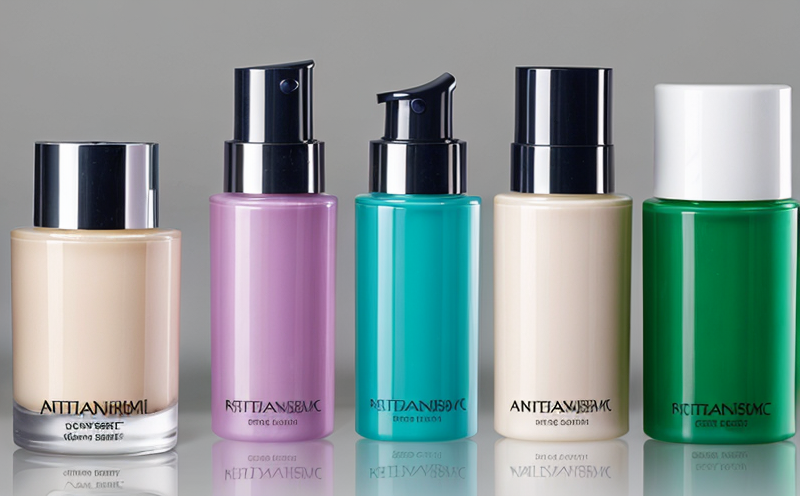ISO 11930 Preservative Efficacy Testing in Cosmetics
The ISO 11930 standard is designed to evaluate the efficacy of preservatives used in cosmetic products. This test ensures that the preservatives effectively inhibit microbial growth and extend the shelf life of cosmetics, thereby enhancing product safety and quality.
Preservatives are crucial components in cosmetic formulations as they prevent contamination by bacteria, fungi, and yeasts. The primary goal of this testing is to determine whether a preservative system can maintain its efficacy over time under various conditions that mimic real-world storage scenarios. This includes high humidity, temperature fluctuations, and exposure to light.
The test procedure involves inoculating the cosmetic product with specific microorganisms (such as Bacillus subtilis, Staphylococcus aureus, or Candida albicans) according to ISO 11930:2018. The samples are then incubated under controlled conditions, and their appearance is monitored for signs of microbial growth.
The key steps in the testing process include:
- Selection of appropriate microorganisms based on the intended use of the cosmetic product.
- Inoculation of the product with the selected microorganisms at specified concentrations.
- Cultivation of samples under conditions that mimic real-world storage environments (e.g., 4°C, 25°C).
- Monitoring for signs of microbial growth over extended periods.
- Evaluation of preservative efficacy based on visual and microbiological criteria.
The results are reported in compliance with ISO standards, providing a clear indication of the preservative's effectiveness. Compliance with such testing ensures that products meet stringent quality and safety requirements set by regulatory bodies worldwide.
Understanding the importance of this test is critical for quality managers and compliance officers who aim to maintain product integrity and ensure consumer safety. R&D engineers also benefit from this service, as it helps in optimizing preservative formulations and identifying potential improvements. Procurement teams can leverage these results to select suppliers that adhere to rigorous testing protocols.
In summary, ISO 11930 efficacy testing is a vital component of cosmetic product development and quality assurance programs. It ensures that products are safe for consumers and meet the highest standards of hygiene and safety.
Why Choose This Test
- Ensures compliance with international standards, enhancing global market access.
- Reduces the risk of product recalls due to microbial contamination.
- Promotes product longevity by verifying preservative efficacy under real-world conditions.
- Supports continuous improvement in cosmetic formulations through comprehensive data analysis.
- Facilitates easier regulatory compliance and harmonization with international regulations.
- Provides robust evidence for claims related to product safety and effectiveness.
- Maintains consumer trust by demonstrating a commitment to quality and safety.
- Supports innovation in preservative technology through detailed insights into efficacy performance.
International Acceptance and Recognition
The ISO 11930 standard is widely recognized across the global cosmetic industry. Regulatory bodies, such as the European Union, FDA (Food and Drug Administration), and other national health authorities, have adopted this standard for evaluating preservative efficacy in cosmetics.
By adhering to ISO 11930, companies can ensure that their products meet the stringent requirements set by these regulatory bodies. This recognition translates into increased trust from consumers and greater market acceptance globally.
The widespread adoption of this standard underscores its importance in establishing a consistent framework for preservative testing. Companies that comply with ISO 11930 are better positioned to navigate international markets and meet the diverse needs of global consumers.
Competitive Advantage and Market Impact
Adopting ISO 11930 efficacy testing can provide significant competitive advantages for cosmetic brands. By demonstrating a commitment to product safety and quality, companies can differentiate themselves in the market. This is particularly important as consumers become more health-conscious and demand products that are free from harmful preservatives.
The results of this test not only meet regulatory requirements but also serve as valuable marketing tools. Brands can use these results to communicate their commitment to consumer safety, thereby building a strong brand reputation. This reputation can lead to increased customer loyalty and higher market share.
In addition, compliance with ISO 11930 can help companies avoid costly product recalls and legal disputes. By ensuring that preservatives are effective under real-world conditions, companies reduce the risk of microbial contamination, which is a leading cause of product spoilage and safety concerns.
The global cosmetic industry is highly competitive, and adopting rigorous testing standards like ISO 11930 can provide a strategic advantage. Companies that lead in quality assurance measures are more likely to attract consumers who value health and safety above all else.





